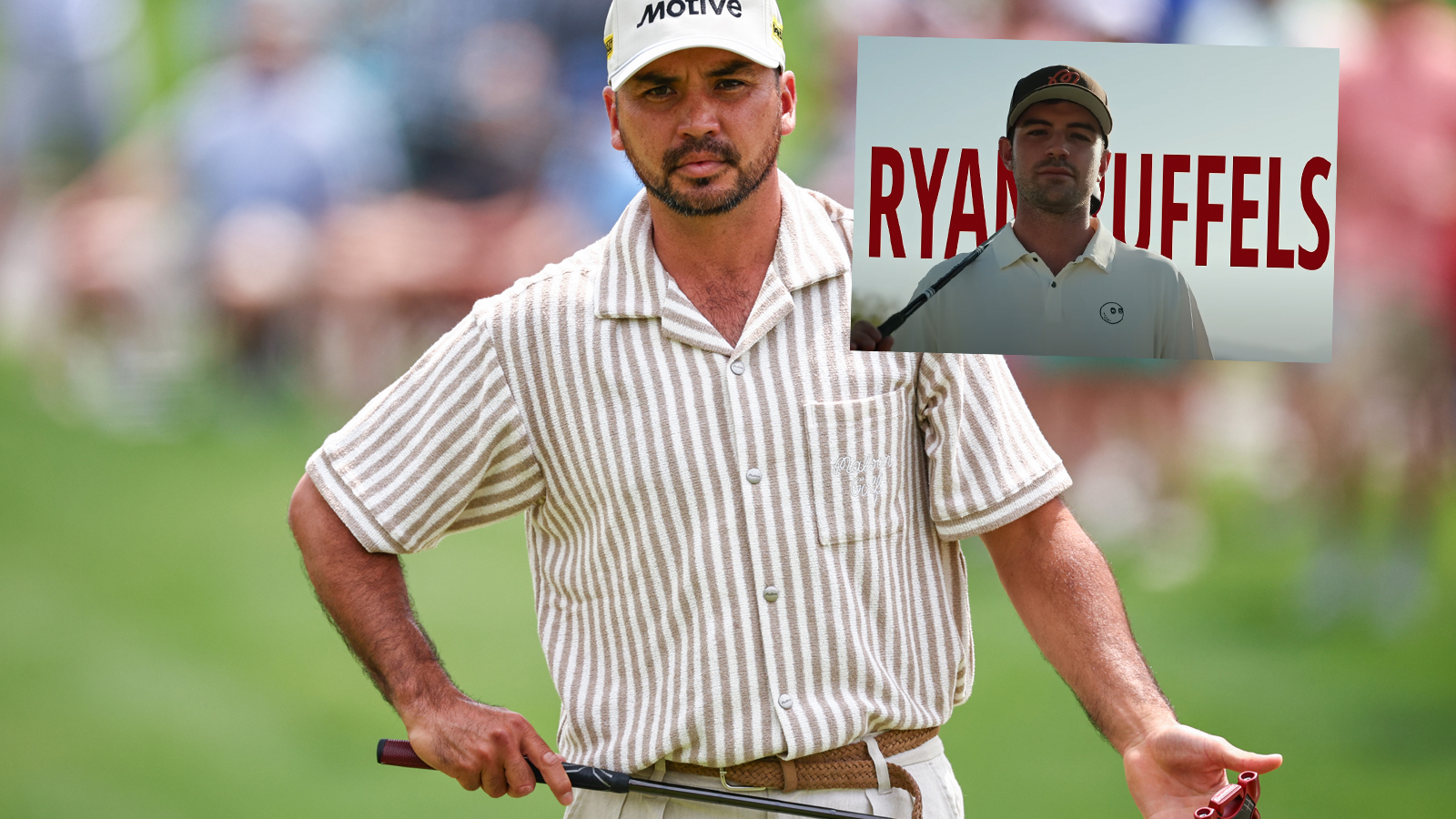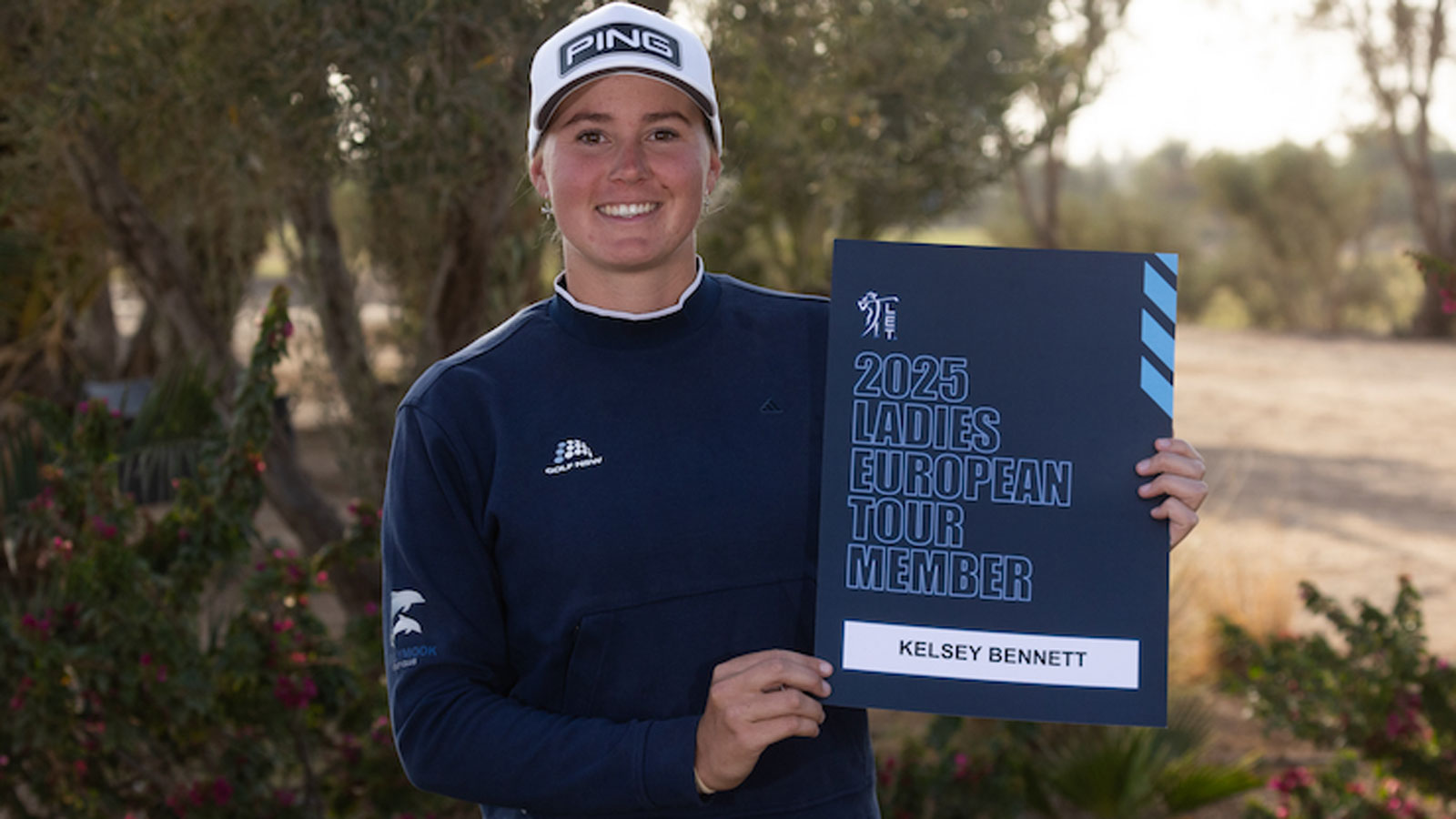The New Kids of NIL – Australian Golf Digest

- by Admin
- November 12, 2024
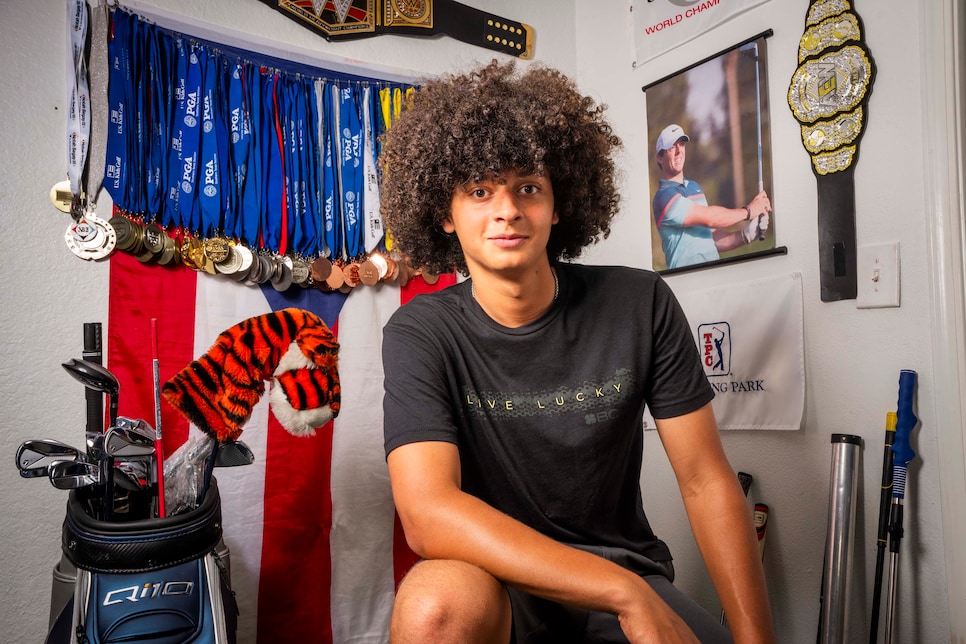
The press conference at the PGA Tour’s Myrtle Beach Classic in May looked like any of the hundreds the tour conducts over a long season. A composed player in a Callaway hat gave polished answers at the podium, even tossing in a chestnut about no tournament really starting until the back nine on Sunday.
However, the star of that show wasn’t a PGA Tour veteran or even an up-and-comer from the Korn Ferry Tour making a spot start in one of the tour’s lower-tier events. It was a 16-year-old amateur who made the cut in his PGA Tour debut just a few months after officially being able to drive. Besides being an immediate contender for the best name in competitive golf, Blades Brown is one of a group of talented and precocious young players who are taking advantage of seismic changes concerning when and how athletes can be paid.
In just three years, elite junior and college players have gone from being highly restricted by the USGA and NCAA to essentially operating in the wild west of professional-level endorsements. Players like Brown—who won’t even be a college freshman for two more years—can sign virtually unlimited name-image-likeness (NIL) deals with partners ranging from equipment manufacturers like Ping, TaylorMade and Callaway to apparel makers and financial services firms. Even local businesses are getting into the act of supporting players long before they ever officially play for pay as professionals. These “new kids of NIL” are changing the way companies spend money on competitive golf and changing the tournament landscape from AJGA events to the college game and on through marquee national events like the U.S. Amateur.
A few months earlier this year, Alabama sophomore Nick Dunlap won The American Express on a sponsor invitation—earning an immediate promotion from the Crimson Tide’s roster to the PGA Tour’s. Brown became one of the youngest players ever to make a cut on the PGA Tour, joking that he would be catching up on schoolwork from the 45 days of high school he had already missed for tournaments. Gianna Clemente won the amateur side of the tandem LPGA-AJGA Mizuho Americas Open, matching the composure of Nelly Korda, her playing partner in the final round. Meanwhile, Lucky Cruz, then 16, shot a final-round 66 to beat out dozens of professionals and earn a card on the Professional Golf Tour of Mexico for the upcoming season.
It’s a new world, set into motion by a 2021 Supreme Court decision limiting the NCAA’s ability to enforce its traditional standards about amateurism. Before NCAA vs. Alston, college players couldn’t accept anything beyond scholarship dollars and gear directly from their schools. This worked in lockstep with the USGA’s amateurism rules, which prohibited accepting anything more than a nominal prize for competing, as well as teaching the game for pay. In the Alston decision, the court determined that college athletes had just as much right to profit from fame and ability as the NCAA and its member institutions, so the doors to NIL were thrown open.
For Cruz’s father Fred, the new “ventilation” couldn’t have come at a better time. He and Lucky had struggled to fund the $60,000 a full season of national competitive amateur golf can cost, and the relaxed rules gave him the freedom to establish a non-profit organization to help cover expenses. “I thought, why don’t we start a not-for-profit and raise money for Lucky’s golf schedule and also help other kids at the same time?” he says. “Whatever extra we got, we gave to the kids that didn’t have. We’re able to say to donors, ‘Hey, you want to help kids, and you need a tax incentive? This is a way to do both.’ It’s reciprocal.”
Donations to the non-profit and NIL deals with brands like apparel company Live Lucky and sports beverage A- GAME meant that the Cruz family could fully outfit a 32-foot RV donated by a sponsor and roam from tournament to tournament. Cruz’ profile increased when he won an event on the Underrated Golf Tour sponsored by NBA star Stephen Curry, and the promotional real estate on the sides of the RV became more valuable. Now the RV is festooned with national and regional branding and prominent links to Cruz’ digital and social channels.
BOYHOOD BEDROOM Cruz proudly displays his golf medals and Puerto Rican heritage on his walls.
Just like pro golf—where endorsement deals range from nine figures for Tiger Woods to free gear and tip money for a Korn Ferry player—amateur NIL is driven by potential “impressions” in all media from social to TV. LSU gymnast Olivia Dunne might have 13 million social media followers to whom she can pitch products like Vuori clothing, but even pre-college amateur golfers can get television time competing in major championships and USGA events and reach audiences nearly as large. A main chest logo for a top-ranked amateur can command between $10,000 and $50,000 annually, and a club/hat deal with an OEM can be on par with the $25,000 (and gear) promising Korn Ferry players receive. Before Rose Zhang turned pro, when she was a top amateur at Stanford, she earned considerably more in NIL/endorsements than the average LPGA player thanks to prime-time exposure in events like the Augusta National Women’s Amateur. Right now the top amateur golfers are earning low six figures in NIL cash—a far shout from the $5 million quarterback Shedeur Sanders will collect this season at the University of Colorado. Still, that’s a different universe than what players like Scottie Scheffler and Viktor Hovland experienced during their college stardom, when scholarship dollars, free irons and team-issued uniforms were the limit.
IT’S A NEW WORLD, SET INTO MOTION BY A 2021 SUPREME COURT DECISION.
Logos and dollars are the most obvious currency in NIL deals, but both players and endorsing companies talk about the “soft” benefits that come with the arrangements. “Some of the people you can meet, they can change your life,” says Lucky Cruz. “I did a Black Clover photo shoot and met Miguel Cotto, a former professional boxer and got a lot of good mental advice from him. I met Collin Morikawa at the Curry Cup and spent a good three or four hours with him. I’ve been able to learn so much.”
MORE: Pro or Amateur? Seeing the line has always been tricky
One of the more prominent non-OEM players in the NIL space is New Jersey wealth management firm Transcend Capital Advisors, which has partnership agreements with a half dozen top junior and college golfers. Managing Partner Brian Gorczynski didn’t start out with a grand NIL plan. The firm’s first deal was with University of Virginia star Ben James in 2022, but the “emerging stars” element of the program resonated with clients and stood out in comparison to more traditional sponsorships with veteran players. Players like James, Brown and Clemente conduct mini-exhibition matches before big amateur events and do Q&As after, giving exposure to business leaders years before they’d get it during tour pro-ams.
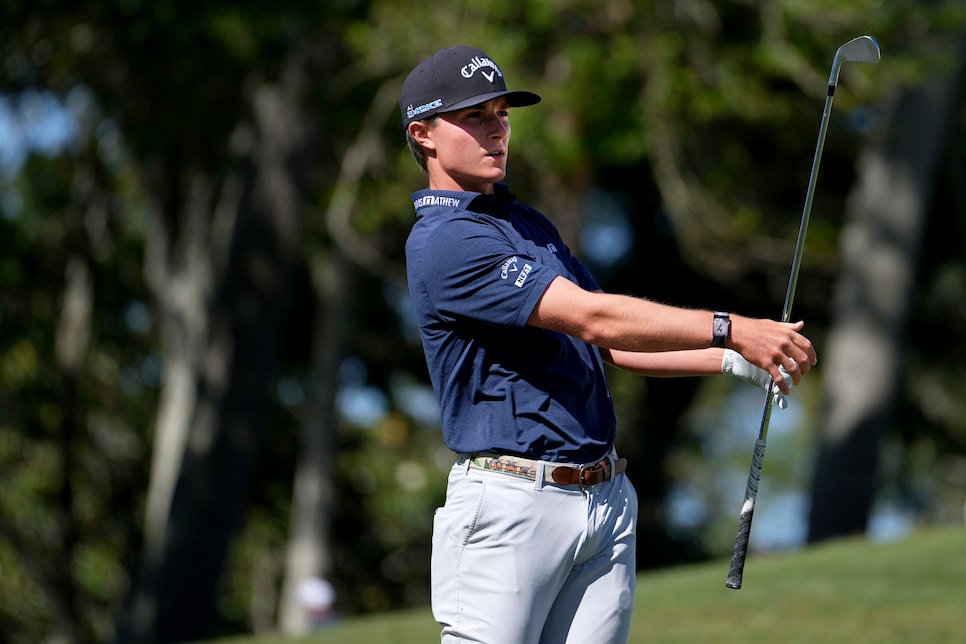
Raj Mehta
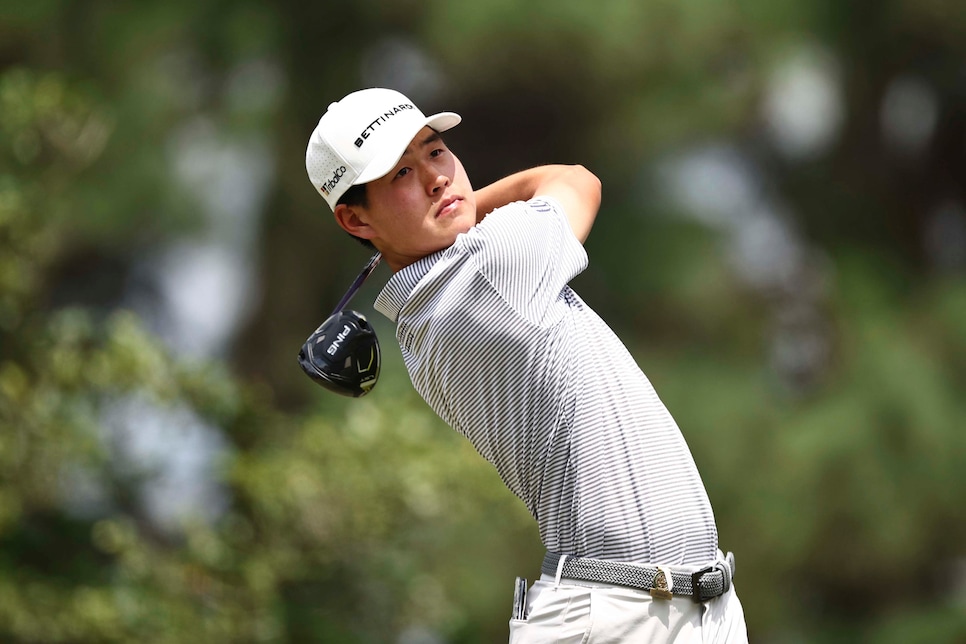
PRO-AMS Blades Brown (top) and Bryan Kim attend school but can sport other logos.
Jared C. Tilton
“How often does a 16-year-old get a chance to speak with senior executives? We think that’s something that helps us build business relationships while helping others achieve their life dreams at the same time,” says Gorczynski. “This is coming from a place of impact and philanthropy, but from a business perspective, it goes beyond that. Golf is a skill set and a tool that is applicable to so many careers. The work ethic and drive it takes these players to compete, that’s a character piece that makes you successful in any career, and we could potentially provide a career for these players in wealth management.”
Judging by Clemente’s game, she’s more likely to work with Transcend Capital as a client than as an employee. The big-hitting Clemente signed NIL deals with Titleist/FootJoy and Amundi along with Transcend and is repped by marquee talent agency WME. “Signing with WME is what slowed everything down for us,” says Patrick Clemente, Gianna’s father. “Now we have a plan where we’re building a path for the next 12 months but also for the next five to ten years. You’re not just building partnerships with NIL but relationships beyond that help you network into the future. The financial support is great, but how her partners support Gianna as an athlete is more impressive than the dollars.”
Imposing some structure on a chaotic process is no small value. Just ask Michigan State men’s golf coach Casey Lubahn. He was at the U.S. Amateur with his player, James Piot, just weeks after the NCAA announced the revisions to its amateur regulations. Players weren’t yet allowed to have agents, leaving Piot and his coach to navigate what used to be one of the simplest decisions on a player’s plate for the day. “When I packed for the trip, I brought a white MSU shirt just in case he needed it,” says Lubahn, who has been the head coach at Michigan State since 2011. “Due to the delicate nature of NIL, I just said, ‘Dude, if you need a shirt, I have one, but you don’t have to.’ A lot of the players that week had already switched to shirts with other logos. James told me, ‘Of course, I’m going to wear a Michigan State shirt.’”
Piot would go on to beat Austin Greaser and win the championship, and by the time Lubahn was able to check his phone after the USGA festivities, he had more than 1,200 unread text messages. “At least 40 percent of them were from people who wanted to know where to get the ‘Swinging Sparty’ shirt James had on,” Lubahn said. “By the time the dust settled, more than a thousand people asked me about that shirt in texts or emails. It took Nike two years to catch up on all the orders.”
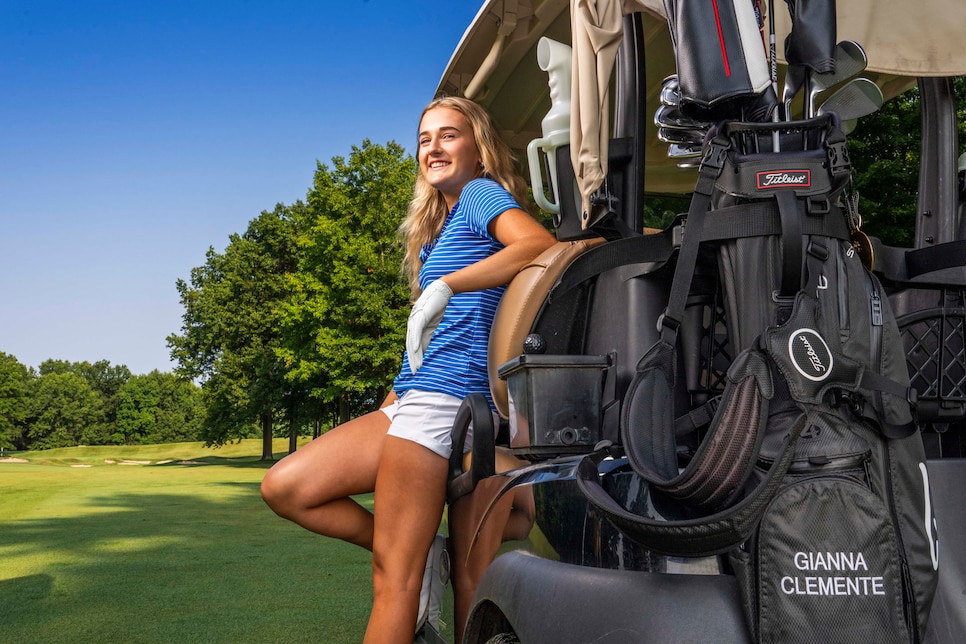
BRIGHT FUTURE Clemente, 16, Monday-qualified into three straight LPGA Tour events.
“HOW HER PARTNERS SUPPORT GIANNA AS AN ATHLETE IS MORE IMPRESSIVE THAN THE DOLLARS.”
Lubahn estimates the exposure increased MSU’s golf fundraising by 50 percent in the year after the win—growth that has sustained even after Piot turned professional. Those real dollars reinforce the market thinking brands undertake with NIL deals. Buying the sleeve or hat of an out-of-nowhere amateur Masters contender like Sam Bennett in 2023 cost less than $50,000 before he made the cut. On the weekend, that real estate was worth seven figures in television and social media exposure. “We’re used to seeing college athletes on television in events like football or the NCAA tournament,” says NIL expert and attorney Luke Fedlam. “But the opportunity to have brand deals in place and represent them against the professionals on the biggest stage? That changes the metric.”
It’s a metric Dunlap parlayed into seven-figure endorsement deals with Adidas and TaylorMade after his win at The American Express. Dunlap had NIL deals with the brands that expired when he turned professional—the week after his win— but the inside route the companies had in negotiating translated into fast professional deals that more than offset the $1.5-million first prize Dunlap “lost” because of his amateur status.
MORE: What’s in My Bag: Nick Dunlap
That’s the same kind of math putter maker Bettinardi did when it signed an NIL deal with 2023 U.S. Junior Amateur champion Bryan Kim. “One of the amateur reps from Bettinardi reached out to me earlier in 2023 asking if I wanted to try a few putters,” says Kim, who is now a sophomore on the Duke golf team. “I ordered a couple and thought they were great but never put one in play. I was struggling with my putting during the summer and decided to switch. The U.S. Junior was the first tournament I played with it.”
Now, Kim plays all his non-Duke golf with a sporty Bettinardi mini-staff bag, and he has also signed a deal with ZIPS Cleaners, a national chain based near Kim’s Brookeville, Maryland home. “All the resources at Duke have been a great help,” says Kim, who is majoring in economics. “The one thing that stands out is how all the staff and students hold themselves to a high standard, so there’s a kind of culture present that holds me accountable and keeps me striving to be my best.”

YOUNG AND IMPRESSIONABLE Puma and Transcend Capital support UVA’s Ben James.
Andrew Redington
IMPOSING SOME STRUCTURE ON A CHAOTIC PROCESS IS NO SMALL VALUE.
At the U.S. Open in Pinehurst, Kim played practice rounds with Adam Scott, Tommy Fleetwood and Denny McCarthy, and he was encouraged that his 170-mph “cruising” ball speed could play in the big leagues. Bettinardi got its money’s worth on Friday, when the long putt Kim lipped out that would have gotten him to the weekend was featured on the broadcast. “I had never been on a stage even close to the U.S. Open before, so just getting comfortable and telling myself I really belong out there was huge for me. Putting my game up against those great players really showed that my skills are just as good. The main separator is how confidently they carry themselves.”
That’s why Brown’s caddie in Myrtle Beach was doing his teenage charge such a big favor when he shot down one of Brown’s spur-of-the-moment proposals. “I wanted Joel Dahmen’s autograph because I’ve seen him on Netflix, but my caddie was like, bro, you don’t need those guys’ signatures.”
Just have them as friends.
This article was originally published on golfdigest.com
The Latest News
-
December 24, 2024North Lamar Australian Basketball
-
December 24, 2024We asked Golf Digest writers the story they were proudest of in 2024, and why – Australian Golf Digest
-
December 24, 2024Blueprint for success: how Australian architects made the world take notice in 2024
-
December 24, 2024‘Novak Djokovic will only care about the Australian Open and Wimbledon’
-
December 24, 2024PNG-Australia NRL Deal: K1.7 billion economic boost and 10,300 jobs expected


